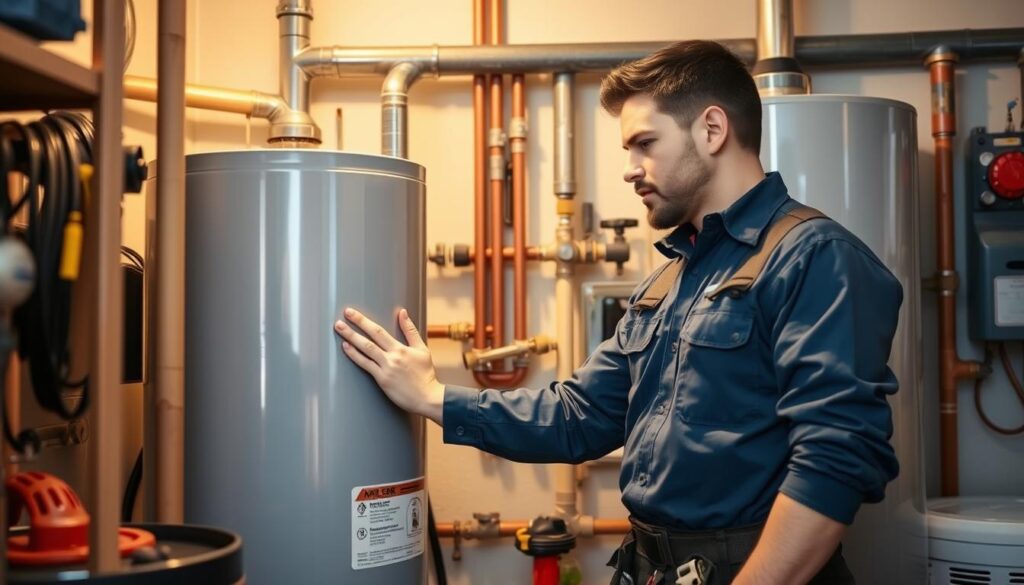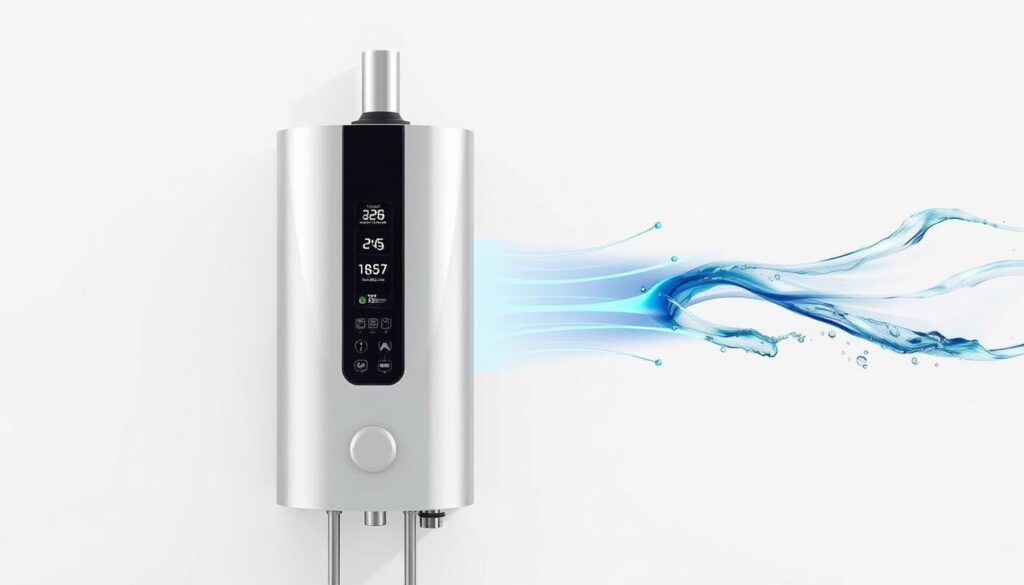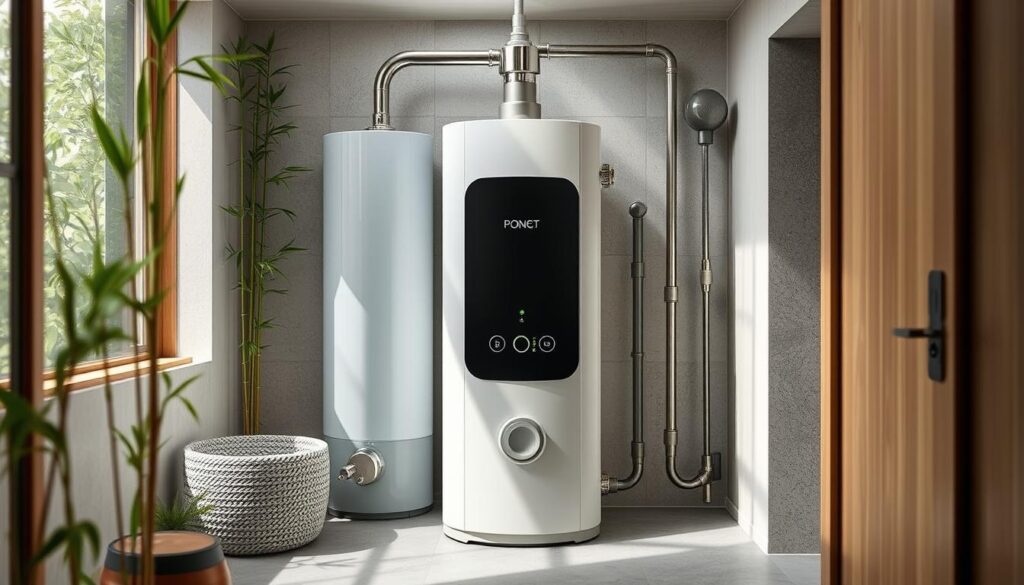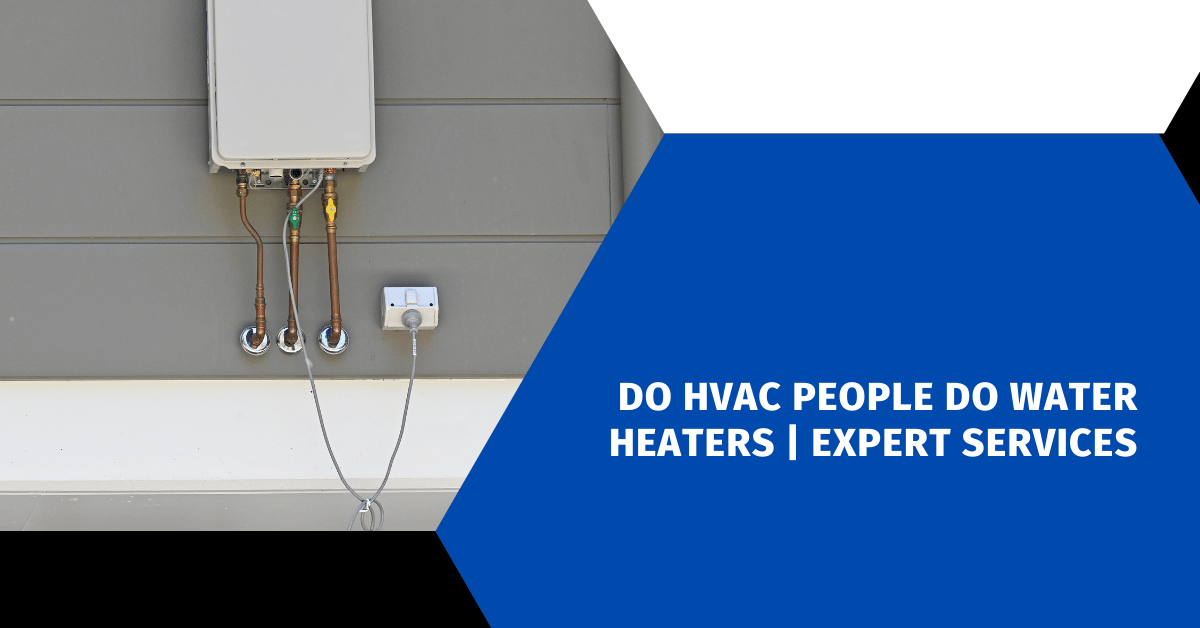Affiliate Disclosure
HVAC Guide Guys is a participant in the Amazon Services LLC Associates Program, an affiliate advertising program designed to provide a means for sites to earn advertising fees by advertising and linking to Amazon.
Do HVAC People Do Water Heaters? When winter hits, we all need hot water to stay warm. But can your HVAC technician help with that? This guide will show you how HVAC skills can meet your water heater needs. We’ll look at the qualifications and rules that make this possible.

Key Takeaways
- HVAC technicians have the skills for water heater repair, upkeep, and setup.
- Hybrid water heaters need special HVAC knowledge because of their heat pump tech.
- Rules for water heater work differ by state and local laws.
- Getting your water heater installed and maintained right is key for safety and efficiency.
- HVAC pros can handle everything, from keeping your home cool to providing hot water, for better comfort.
Table of Contents
Understanding the Overlap Between HVAC and Water Heater Services
HVAC contractors work on heating, cooling, and ventilation systems. They also handle water heater maintenance and installation. This is because there’s a lot of overlap between these fields.
The Role of HVAC Technicians in Water Heating Systems
HVAC technicians know a lot about temperature control systems. These are key in water heaters. In emergencies, they can even shut off water or gas supply. This shows their versatility and skill transfer.
Technical Skills and Expertise Required
HVAC technicians, especially those with NATE certification, can tackle water heater problems. They’re good at troubleshooting and routine maintenance. Their knowledge of heating systems, gas lines, and electrical parts helps them solve many water heater issues.
Industry Certifications and Training
The ability of HVAC contractors to offer water heater services depends on where they are and local laws. In some places, they can replace water heaters without a plumbing license. But in others, a plumbing license is needed, even if they’re HVAC experts.
| Location | Water Heater Installation Requirements |
|---|---|
| Huntsville, AL | Plumbing license required |
| California | Plumbing license generally necessary |
| New Jersey | HVAC license alone insufficient, plumbing license required |
| Virginia | HVAC professionals allowed to install water heaters |
The connection between HVAC and water heater services is key for homeowners and businesses. Knowing the technical skills and licensing needs helps them make smart choices. This ensures they get the right help for their needs.
Explore Our HVAC Shop
Looking for top-rated HVAC tools, parts, and accessories? Visit our shop and find the perfect solution for your needs.
Visit the ShopDo HVAC People Do Water Heaters: The Complete Guide
Many homeowners ask if HVAC technicians can install and maintain water heaters. The answer varies by location and licensing rules. In some places, HVAC contractors can work on water heaters. But in others, only licensed plumbers are allowed to do this job.
Installing a water heater is as complex as installing a furnace or air conditioner. But, rules about who can do this work differ a lot. Some areas require special licenses for water heater jobs because of safety concerns.
HVAC service providers can suggest water heaters that work well with HVAC systems. Some HVAC companies might even install water heaters for you. It’s a good idea to ask if they specialize in water heaters or have experience with them.
Not all HVAC companies offer water heater services. If they don’t, you might need to hire a plumber separately. Plumbers usually offer a warranty for their water heater work. This can help avoid unexpected repair costs.
Choosing the right professional, whether an HVAC tech or a plumber, is key for a safe water heater installation. Local plumbers are often very skilled in installing water heaters. Using the same company for both plumbing and HVAC can also save you time and money.
“NATE certified technicians are preferred for handling plumbing and heating issues, as they have the necessary expertise and training to ensure the proper installation and maintenance of water heaters.”
Experienced cooling and heating companies know a lot about different equipment, including water heaters. When picking an HVAC service company, make sure to choose one with experience in water heaters. This ensures your home’s water heating needs are met well.
Explore Our HVAC Shop
Looking for top-rated HVAC tools, parts, and accessories? Visit our shop and find the perfect solution for your needs.
Visit the ShopLicensing Requirements and Regulations for Water Heater Installation
Installing a new water heater requires knowing local licensing and safety rules. In the U.S., these rules differ by state, city, and county. It’s important to understand these differences.
State-Specific Requirements
In Colorado, only licensed plumbers can install water heaters. They must work for a registered contractor with the right permit. The state sees plumbing as key to public health and safety.
In Texas, a plumbing permit is needed for water heater installations since 2007. The city issues the permit and checks the installation. Homeowners can install water heaters themselves but need a permit to do it right.
Permit Requirements and Inspections
In every state, you need a permit and inspection for water heater installations. This ensures the installation meets local plumbing permits, water heater regulations, and safety standards. Wrong installation can cause water damage, safety risks, and void warranties.
Safety Compliance Standards
Water heater installations must follow strict safety rules. These rules protect against dangers like carbon monoxide poisoning, fires, and scalding. Not following these can lead to fines, legal trouble, and personal liability.
By knowing and following plumbing permits, water heater regulations, and safety standards in your area, you ensure a safe installation. This protects your home, family, and investment.
Explore Our HVAC Shop
Looking for top-rated HVAC tools, parts, and accessories? Visit our shop and find the perfect solution for your needs.
Visit the ShopTraditional vs Modern Water Heater Systems
Water heating solutions for homes have changed a lot over time. Traditional tank-style water heaters hold 20 to 50 gallons of hot water. But, tankless water heaters and hybrid water heaters offer more energy-efficient and cost-effective options.
Tankless water heaters heat water on-demand, giving 2 to 5 gallons per minute. This system saves a lot of energy since it doesn’t need a big tank. Homes using less than 41 gallons of hot water a day can save 24% to 34% in energy costs.
Hybrid water heaters use a tank but also a heat pump to make hot water. This mix of storage and energy efficiency makes them a favorite among homeowners.
| Feature | Traditional Tank Water Heater | Tankless Water Heater | Hybrid Water Heater |
|---|---|---|---|
| Water Heating Capacity | 20-50 gallons | On-demand, 2-5 gallons per minute | Storage tank with heat pump technology |
| Energy Efficiency | Lower | Higher, up to 34% energy savings | Higher, similar to HVAC systems |
| Lifespan | Approx. 12 years | Approx. 20-25 years | Approx. 15-20 years |
| Maintenance | More maintenance required | Less maintenance required | Moderate maintenance required |
| Installation Cost | Lower | Higher | Higher |
| Operating Cost | Higher | Lower | Moderate |
Modern water heaters might cost more at first, but they save money and last longer. Choosing between traditional, tankless, or hybrid water heaters depends on your needs, energy goals, and budget.
Common Water Heater Issues and Solutions
Keeping your water heater in good shape is key to having hot water when you need it. As water heaters get older, they can run into common problems. Spotting these issues early can help avoid bigger, more expensive repairs.
Signs of Water Heater Problems
- Running out of hot water faster than usual
- Frequent need for repairs
- Older age (most water heaters last 8-10 years)
- Corrosion or discolored water
- Leaks from the tank or connections
- Noisy operation, such as rumbling or popping sounds
Troubleshooting Tips
Regular upkeep can stop many water heater problems and make it last longer. This includes draining the tank to clear out sediment, checking the anode rod, and making sure the temperature and pressure relief valve works right. Also, insulating hot water pipes can save energy.
When to Call a Professional
Some water heater troubles need a pro’s help. This includes:
- Severe water heater damage or tank corrosion
- Discolored or foul-smelling water, indicating potential bacterial contamination
- Inadequate hot water supply, despite troubleshooting efforts
By spotting water heater issues early and fixing them fast, you can keep your water heater running well. Remember, regular water heater troubleshooting, repair services, and maintenance tips are essential for reliable hot water at home.
Explore Our HVAC Shop
Looking for top-rated HVAC tools, parts, and accessories? Visit our shop and find the perfect solution for your needs.
Visit the ShopUnderstanding Hybrid Water Heater Technology
Hybrid water heaters are becoming more popular for their energy-saving features. They mix the good parts of traditional and tankless water heaters. This makes them a great choice for those looking to save on energy costs.
The heart of these water heaters is the heat pump. It works like an HVAC system, using air heat to make hot water. This method is much more efficient than old electric or gas water heaters, saving money in the long run.
Heat pump HVAC systems use about 40% less electricity than old systems. In July, they used 421 kilowatt-hours, down from 800 kilowatt-hours in August 2022. This makes hybrid water heaters very appealing.
Hybrid water heaters also come with financial perks. You can get a federal tax credit of up to $2,000 a year and $500 rebates from utility providers like Georgia Power. They are also 3 times more efficient than electric water heaters and up to 50% more efficient than natural gas ones, as the U.S. Department of Energy and ENERGY STAR say.
Water heating uses almost 20% of a household’s energy. Hybrid water heaters can help save a lot of money and reduce environmental harm over time.

As we look at new water heating options, hybrid water heaters stand out. They offer energy savings, cost benefits, and help the environment. These modern systems are set to become a big part of our future heating needs.
The Benefits of Working with HVAC Professionals for Water Heaters
Working with HVAC experts for your water heater has many benefits. They have HVAC expertise and offer comprehensive home services. This can save you time and money.
Expertise in Temperature Control Systems
HVAC technicians know a lot about temperature control systems. This is key for your water heater to work well. They can find and fix problems fast, thanks to their expertise in heat transfer and energy efficiency.
Combined Service Benefits
Many HVAC companies offer both HVAC and water heater services. This is great for homeowners because it saves time. You get comprehensive home services and might even save energy with integrated systems.
“The HVAC technicians were incredibly knowledgeable and quickly resolved the issue with my water heater. I was impressed by their attention to detail and the seamless way they handled the entire process.”
HVAC pros can do a lot for your water heater, from maintenance to repairs. Their knowledge of temperature control and ability to offer combined services make them a top choice for homeowners.
Water Heater Maintenance and Service Schedules
Keeping your water heater in good shape is key to its performance and life span. Regular checks and maintenance can make your water heater last longer and avoid expensive repairs later.
Experts say you should flush your water heater once a year to get rid of sediment. Sediment buildup can make your water heater less efficient and shorter-lived. Flushing it yearly can help it last 10-20 years.
There are other tasks to do regularly too:
- Check the anode rod and replace it every 3-5 years to stop tank corrosion.
- Make sure the temperature and pressure relief valve works right.
- Look for leaks or damage and fix them fast.
How often you need to do these tasks depends on your water heater type, water quality, and how much you use it. Joining a service club, like Stan’s Plumbing Gold Service Club, can give you yearly water heater flushes, repair discounts, and fast service.
| Water Heater Type | Average Lifespan with Proper Maintenance |
|---|---|
| Tank Water Heater | Up to 12 years |
| Tankless Water Heater | Up to 20 years |
Regular maintenance keeps your water heater running well and lasting longer. This saves you money and avoids sudden breakdowns.
Explore Our HVAC Shop
Looking for top-rated HVAC tools, parts, and accessories? Visit our shop and find the perfect solution for your needs.
Visit the ShopEnergy Efficiency and Cost Savings
Energy efficiency is crucial for saving money on water heating. Modern water heaters have features that cut down on utility bills. They include tankless systems and hybrid models with heat pump technology.
Modern Energy-Saving Features
Today’s water heaters use advanced tech to save energy. Tankless models heat water only when needed, saving a lot of energy. They can be up to 30% more efficient than old systems.
Heat pump water heaters use air heat, not electricity. They are two to three times more efficient, saving you money over time.
Long-term Cost Benefits
Energy-efficient water heaters cost more upfront but save money in the long run. In New England, the average energy bill is $116.97 a month. Lowering the hot water tank by 20 degrees can save 6-10% on bills, about $12 a month.
These water heaters also help the environment by cutting down on emissions. With the right features and installation, you save money and help the planet.

Choosing Between HVAC Technicians and Plumbers
Homeowners often struggle to choose between HVAC technicians and plumbers for water heater services. The decision depends on local laws, the problem at hand, and the service provider’s skills.
In some places, only licensed plumbers can work on water heaters because they connect to the public water supply. But, HVAC technicians might be better for hybrid or heat pump water heaters. They need special knowledge of temperature control systems.
For electrical water heater issues, an electrician is often the best choice. Some companies offer both HVAC and plumbing services. This can be a great solution for homeowners.
Expertise and Versatility
HVAC technicians have a wide range of skills, working on heating, ventilation, and air conditioning. This can be helpful for complex water heater systems. Plumbers, on the other hand, focus on water and waste systems, which is crucial for some water heater problems.
Experts say HVAC work is more varied and challenging than plumbing. It’s also cleaner and safer. HVAC technicians can also earn more, especially with experience and certifications.
In the end, choosing between HVAC technicians and plumbers depends on the homeowner’s needs, local laws, and the service providers’ expertise in your area.
Professional Installation and Safety Considerations
Getting a professional to install your water heater is key for safety and performance. A bad installation can cause leaks, fires, and even carbon monoxide poisoning. But, a well-installed water heater keeps your hot water safe, efficient, and lasts longer.
Choosing a pro for your water heater saves you time, money, and stress. They know the latest safety rules and what each water heater type needs. They pick the best size and setup for your home, saving you money and energy.
It’s vital to have the right venting and gas connections to avoid fires. Wrong gas connections can cause explosions. Also, bad pressure release valves can flood your home. And, poor venting can lead to deadly gas leaks from gas water heaters.
By picking a licensed and insured pro, you follow local building codes and get the right size. You also get efficient venting to lower risks. This smart choice protects your home and saves you from expensive fixes later.
Conclusion
Whether you need HVAC help for your water heater depends on where you live, local laws, and the water heater type. Plumbers used to handle water heaters alone. But now, with new tech, HVAC experts are also involved.
Looking into HVAC water heater services? Check your local rules and the water heater’s features. See what kind of problem you’re facing. This will tell you if you need an HVAC tech or a plumber.
Choosing HVAC pros for your water heater has its perks. They know a lot about temperature control. Plus, they can make your system more efficient and cost-effective. Make sure to pick wisely for the best results.

